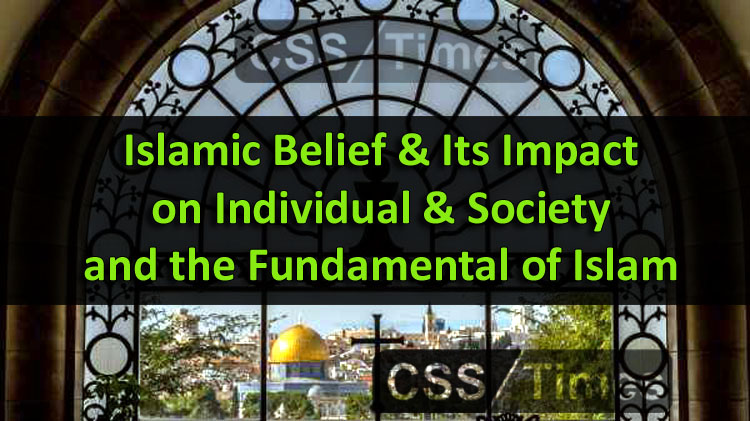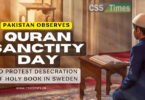Islamic Belief & Its Impact on Individual & Society and the Fundamental of Islam
1. The Reality and Importance of Belief:
The source of all human actions is the mind. There are two states of the mind with regard to it being the source of actions. The first is that there are no particular concepts deeply embedded in it. Instead, various scattered thoughts pass through it and whichever amongst these are strong become the stimuli for actions that are undertaken by the possessor of this mind. The second state is one in which the mind no longer remains the abode of such stray thoughts, and instead a few distinctive concepts become so deeply rooted in that the bearer’s practical life permanently comes under their influence. Instead of taking unfocused actions, this mind becomes the center of organized and disciplined acts. The first state may be likened to a public road that is open for use by all and is not a restricted thoroughfare. The other state is like a mould that gives rise to parts of a specific design and distinct appearance.
When the human mind is in the first state we say that it does not have a character. The bearded of such mind could be Shaitan or could be an angel. There is unpredictability in his temperament. In cannot be said with certainty as to what kind of actions such and individual may carry out at any given time. On the contrary, when a person comes into the second state we say that he has a character and that there is a discipline and a certain order in his practical life. It can now be predicted with confidence as to what actions such an individual would carry out under certain given conditions.
2. An Overview of Belief System:
The Islamic belief system is founded upon Tawhid, that is, an affirmation that there is one God, the sustainer of the entire universe, Who is worthy of human devotion and dedication. Belief in God constitutes the integrity of human existence, individually and as a member of society. The Qur’an speaks about God as the being whose presence is felt in everything that exists; everything that happens is an indicator of the divine. Faith in God results in being safe, well integrated, sound, and at peace. Life is the gift of God, and the body is the divine trust given to humankind to enable it to serve God as completely and fully as the wonderful creation of God has made that serving possible. The humble origin of humans is established by the Quranic reference to their creation from “dry clay of black mud formed into shape.” (Quran. 15:26) Through the well-proportioned creation of human being in God’s image and the perpetual guidance provided to perfect it both spiritually and morally, human beings have been given the trusteeship of their body. On the Day of Resurrection, all parts of the human body will have to account for the actions of the person whose bodily organs they formed.
The Qur’an affirms reverence for human life in reference to a similar commandment given to other monotheists: “We decreed for the Children of Israel that whosoever kill a human being for other than manslaughter or corruption in the earth, it shall be as if he had killed all humankind, and whoso seventh the life of one, it shall be as if he saved the life of all humankind.” (Quran. 5:32) this passage has provided Muslims with religious justification to engage in all scientific and humanitarian activity to protect humanity against peril by choosing to save oneself and others from perdition and serve humanity as service to God. The corollary of the belief in God’s guidance is human accountability to further God’s purposes on earth. The purpose of creation is to allow human beings, created with the capacity to learn and to exercise their will, freely to accept the responsibility of perfecting their existence by working with the laws of nature grasped by the God-given innate disposition (fitra) and understanding the nature of things that regulate their well-being. The Qur’an emphasizes God’s benevolence, all-forgivingness, and mercy. But it also puts emphasis on God’s justice, and stresses that humanity should develop moral and spiritual awareness (taqwa) in fulfilling everyday requirements of life.
Human existence is not free of tension and inner stresses caused by rejection of truth (kufr) and impairment of moral consciousness. To help humanity in realizing its actual potentials, God sends prophets “to remind” humanity of its covenant with God (Quran. 7:172). There have been 124,000 Prophets from the beginning of history, of whom five (Noah, Abraham, Moses, Jesus, and Muhammad (PBUH)) are regarded as “messengers” sent to organize their people on the basis of the guidance revealed by God. The prophets, then, are role models for their followers. They provide them with all the necessary practical guidance to live as an ethical community. This practical guidance takes the form of religious laws, the Sharia, which is in need of constant elaboration to make it relevant at all times. In order to provide this critical role of the practical guidance even after the prophets have successfully delivered God’s message to the people, the Qur’an speaks about the function of an Imam a spiritual and moral leader in human communities. These well-qualified and exemplary leaders the Imams call people to observe fairness and abide by justice in their dealings with one another. By molding their own lives upon the teachings of the Prophet, they provide incontestable evidence for their leadership. There are twelve such Imams, beginning with Imam `Ali (d. 660 C.E.), who succeeded the Prophet in his role as the spiritual and moral leader of the community. The Twelfth and the last Imam al-Mahdi continues to guide his community in all matters connected with its spiritual and moral well-being.
3. Belief in one God,
The religion of Islam is based on one core belief, that there is no god worthy of worship but Allah. When a person embraces Islam or a Muslim wants to renew or confirm his or her faith, they profess their belief that there is no god worthy of worship but Allah and that Muhammad is His final messenger. Ashadu an la ill laha il Allah wa Ashadu anna Muhammadan Rasulullah, Saying these words, the Testimony of Faith, is the first of five pillars or foundations of the religion of Islam. Belief in God is the first of six pillars of faith.
Muslims believe that there is only One God. He alone is the Sustainer and Creator of the universe. He is without partners, children, or associates. He is the Most Merciful, the Most Wise, and the Most Just. He is the all hearer, all seer, and the all-knowing. He is the First, He is the Last.
“Say (O Muhammad), He is Allah, (the) One. Allah-us-Samad (The Self-Sufficient Master, Whom all creatures need, He neither eats nor drinks). He begets not, nor was He begotten; and there is none co-equal or comparable unto Him.” (Quran 112)
Check also: Islamic Studies MCQs
“He is the Originator of the heavens and the earth. How can He have children when He has no wife? He created all things and He is the All-Knower of everything. Such is Allah, your Lord! La ilaha illa Huwa (none has the right to be worshipped but He), the Creator of all things. So worship Him (Alone), and He is the Trustee, Disposer of affairs, Guardian, over all things. No vision can grasp Him, but His Grasp is over all vision. He is the Most Subtle and Courteous, Well Acquainted with all things.” (Quran 6:101-103)
This belief is sometimes called Monotheism which is derived from the Greek words ‘monos’ meaning only and ‘theos’ meaning god. It is a relatively new word in the English language and it is used to denote a supreme being Who is all-powerful, the One who is responsible for life, the One who rewards or punishes. Monotheism is directly opposed to Polytheism, which is belief in more than one god, and to Atheism, a disbelief in all deities. If we were to take into consideration the general meaning of the word ‘monotheism’ Judaism, Christianity, Islam and Zoroastrianism, and some Hindu philosophies could all be included. However it is, more commonplace to refer to Judaism, Christianity, and Islam as the three monotheistic religions and group them together; nonetheless, there are glaring differences between Christianity and Islam. The concept of a trinity inherent in most Christian denominations ostensibly includes aspects of plurality. The belief that one God is somehow three divinities (father, son, and Holy Spirit) contradicts the concept of Monotheism inherent in Islam, where the Oneness of God is unquestionable. Some Christian groups, including those known as Unitarians believe that God is one and cannot be God and human at the same time. They take the words of Jesus in John 17:3, “the One True God” literally. However, the vast majority of Christians do not share this belief.
In the religion of Islam belief in One God, without partners or associates is essential. It is the focal point of the religion and it is the essence of the Quran. The Quran calls on humankind to worship God alone and to give up worshipping false gods or associates. The Quran urges us to look at the wonders of creation and understand God’s greatness and power, and it speaks directly of His names, attributes, and actions. The Quran commands us to reject anything that is worshipped instead of, or along with God.
“And I (God) created not the jinn’s and humankind except they should worship Me (Alone).” (Quran 51:56)
Islam is often referred to as pure monotheism. It is not adulterated with strange concepts or superstitions. Belief in One God entails certainty. Muslims worship God alone, He has no partners, associates, or helpers. Worship is directed solely to God, for He is the only One worthy of worship. There is nothing greater than God Alone.
“Praise and thanks be to God, and peace be on His slaves whom He has chosen (for His Message)! Is God better, or (all) that you ascribe as partners (to Him)?” (Of course, God is better)
Is not He (better than your gods) Who created the heavens and the earth, and sends down for you water (rain) from the sky, whereby We cause to grow wonderful gardens full of beauty and delight? It is not in your ability to cause the growth of their trees. Is there any god with God? Nay, but they are a people who ascribe equals (to Him)!
Is not He (better than your gods) Who has made the earth as a fixed abode, and has placed rivers in its midst, and has placed firm mountains therein, and has set a barrier between the two seas (of salt and sweet water).Is there any god with God? Nay, but most of them know not. Is not He (better than your gods) Who responds to the distressed one, when he calls Him, and Who removes the evil, and makes you inheritors of the earth, generations after generations. Is there any god with God? Little is that you remember! Is not He (better than your gods) Who guides you in the darkness of the land and the sea, and Who sends the winds as heralds of glad tidings, going before His Mercy (rain)? Is there any God with God? High Exalted be God above all that they associate as partners (to Him)! Is not He (better than your so-called gods) Who originates creation, and shall thereafter repeat it, and Who provides for you from heaven and earth? Is there any god with God? Say, “Bring forth your proofs, if you are truthful.” (Quran 27:59-64)
Read Also: ISLAMIAT Important & Selected Solved MCQs For Competitive Exams (Set-I)
4. Daily Prayer
Daily Prayer is daily worship, required five times a day: at dawn, midday, afternoon, evening, and night. These prayers are very short, and require bowing and prostration. A Muslim may worship anywhere, preferably in congregation, facing Makkan. Muslims are required to worship as a community on Fridays at midday and on two major religious holidays. The congregational prayer gives expression to the believer’s religious commitment within the community. The Qur’an prescribes the state of physical purity for the worshipper through the performance of ablutions and a full washing after sexual intercourse or a long illness prior to undertaking worship. Women are required to perform a full washing after the menstrual cycle and childbirth because blood is regarded as ritually unclean. Islamic law prescribes regular cleansing and physical hygiene as expressions of one’s faith. Prayer in Islam is regarded therapeutically. Besides seeking medical treatment Muslims are encouraged to seek healing, especially in psychological illnesses, by praying to God. Many illnesses, according to the teachings of the Prophet, are caused by psychological conditions like anxiety, sorrow, fear, loneliness, and so on. Hence, prayer restores the serenity and tranquility of the soul.
5. Prayer’s Importance in Islam
Prayer, in the ritual sense, is an obligation of the faith, to be performed five times a day by adult Muslims. According to Islamic law, prayers have a variety of obligations and conditions of observance. However, beyond the level of practice, there are spiritual conditions and aspects of prayer which represent its essence.
6. In the Holy Quran, Allah says:
“I created the jinn and humankind only that they might worship Me.”
Thus, prayer first and foremost, is the response to this Divine directive to worship the Creator. Prayer represents the individual’s affirmation of servant hood before the Lord of Creation and submission to His Omnipotent Will. It also represents a willing acknowledgment of our weakness and neediness by seeking Divine Grace, Mercy, Abundance and Forgiveness. Prayer, then, is a willful, directed action by the believer, seeking direct, unmediated communication with Allah, for Muslims believe that every human being is of interest to the Divine. It also represents a concrete manifestation of the Islamic conception of freewill, in that the decision to pray is one that must be made by each individual. In this way, prayer is a uniquely “human” form of worship, for all other creatures submit without question to Allah’s Will and are engaged in His praise, glorification and remembrance, as the Holy Quran asserts:
“And there is not a thing but hymneth His praise; but ye understand not their praise.”
Prayer, by its very nature, is a form of request or entreaty, and thus requires the full conscious participation of the one praying, with will, intellect, body and soul. The one engaged in prayer is in direct connection with the Creator Who hears everything the supplicant says and responds though not necessarily in the affirmative to each request. This is the concrete manifestation of Allah’s role as The Hearer, The Aware and The Responsive, which represent three of the ninety-nine Holy Names and Attributes of Allah that form the basis of the Islamic conception of the Divine. In Islam, there are two forms of prayer. One has ritual, formal requirements and manners, which are essential to its correct observance. This is called šalat. The other form is supplicatory prayer, and in its more general sense, represents an open-ended conversation with Allah, which may occur at any time or place, with few restrictions or requirements. It is called dua.
Read Also: Importance Of Deen In Human Life | Notes for Islamic Studies (CSS / PMS)
7. Supplication
The term dua is derived from the Arabic verb meaning “to supplicate” or “to call upon.” Other similar terms for such prayer are munajah, nidā, and aļ-ļarua.
Munajah means “a secret conversation with Allah,” usually with the intention of seeking delivery and relief. Referring to this form of prayer, Allah says in the Holy Quran:
“Who delivered you from the darkness of the land and the sea? Ye call upon Him humbly and in secret, (saying): If we are delivered from this (fear) we truly will be of the thankful.”
Nida means “to call upon Allah while withdrawn from people.” The Holy Qur’ān relates the story of the prophet Zachariah who, having no son, beseeched Allah in his old age to give him a successor to inherit his prophetic knowledge and duties:
A mention of the mercy of thy Lord unto His servant Zachariah. When he cried unto his Lord a cry in secret, Saying: My Lord… gives me from Thy Presence a successor who shall inherit of me and inherit (also) of the house of Jacob… (It was said unto him): O Zachariah! Lo! We bring thee tidings of a son whose name is John; We have given the same name to none before (him).
Aļ-ļarua means “a loud entreaty to Allah for safety,” as mentioned in the Holy Quran:
“Before thee We sent (apostles) to many nations, and We afflicted the nations with suffering and adversity, that they might submissively entreat (Him)!”








[…] Check Also: Islamic Belief & Its Impact on Individual & Society and the Fundamental of Islam […]
I want to save these notes in my personal phone memory bcz it’s difficult to open the page for the topic again and again… kindly if you people allow copying the contents from the page…I have no intentions for plagiarism or something else just want to study the stuff. Thanks
Dear you can download all these in PDF
[…] Check Also: World Religions | Islamiat MCQs for CSS and Competitive Exams Check Also Islamic Belief & Its Impact on Individual & Society and the Fundamental of Islam […]
This is so off the topic. You haven’t even touched what they are asking.